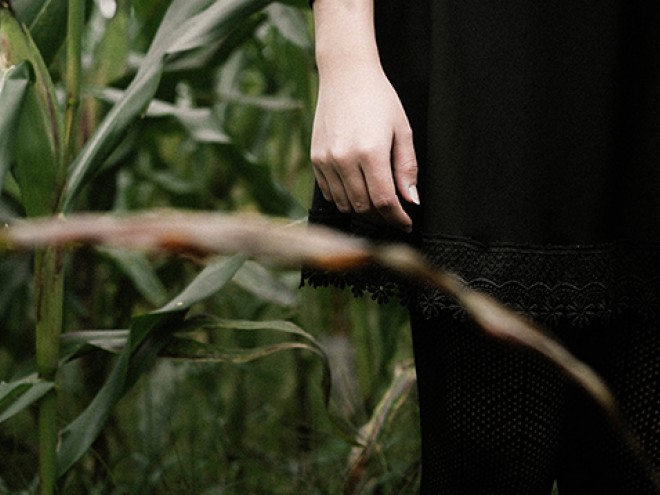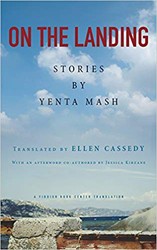Ellen Cassedy and Yermiyahu Ahron Taub received the Yiddish Book Center’s 2012 Translation Prize for their work on the fiction of Blume Lempel, now compiled into the book Oedipus in Brooklyn and Other Stories. Ellen and Yermiyahu will be guest blogging for the Jewish Book Council all Week as part of the Visiting Scribe series here on The ProsenPeople.
We had no idea what we were getting ourselves into when a book with a plain gray cover came our way some years ago.
The volume was a gift from an elderly teacher of Yiddish literature. Signed by the author, it had been published in Yiddish in Tel Aviv in 1981. We did not know much about Blume Lempel, beyond the fact that she’d been born in 1907 in what is now Ukraine, had managed to flee to New York just before World War II, and had continued writing in Yiddish into the 1990s.
We learned that she had spent ten years in Paris before the war, participating in the flourishing Jewish cultural life there. She was later published throughout the world in the postwar Yiddish press and garnered numerous prizes, and admired by leading Yiddish writers, including Yonia Fain, Chaim Grade, Malka Heifetz-Tussman, Chava Rosenfarb, and Osher Jaime Schuchinski. She died in 1999.
Within the covers of this little grey book, we discovered big surprises, a wide range of subjects explored through an astonishing poetic style and unorthodox narrative techniques. Our amazement only grew when we came to the story called “Oedipus in Brooklyn,” which we selected as the title story for our collection.
Lempel’s longtime editor, Abraham Sutzkever, who published many of her stories in the prestigious Yiddish literary journal Di goldene keyt, refused to touch “Oedipus.” Too shocking, he said. Lempel had to wait several years before it appeared in print in her first collection, the book with the plain gray cover.
Shocking? Maybe. But in Lempel’s hands, the story is neither sensational, tawdry, nor played for laughs. Her account of a contemporary woman involved in a transgressive relationship with her son is masterfully compassionate and compelling. Step by step, Lempel fearlessly leads the reader into the heart of darkness. She tells of the car accident that kills the father and blinds the son, of the growing closeness between mother and son, of their increasing isolation. Finally, the two leave the familiar streets of Brooklyn and move to Florida, a perfect backdrop of horror for the advancing tragedy:
A blinding haze hung in the air like carbon fumes. The earth was scorched, the waterways dried up, the white egrets disappeared. The roots of the mangrove trees, naked and greedy, waited for a drop of water. Creeping insects of all kinds eked out their slithery existence, leaving behind silver threads of slime on the desiccated waterbed.
Only the sea in its stoic indifference did not cease its endless song.
By the story’s end, the reader has come to understand and perhaps even sympathize with the plight of mother and son alike.
If “Oedipus in Brooklyn” is unmatched in its boldness, other stories by Lempel also break new ground. Again and again, as she explores the lives of a broad range of mostly female characters, Lempel takes up subjects considered untouchable by other writers. We listen to the furious inner thoughts of a woman pushing a vacuum cleaner. We sense the melancholy of a woman knitting. We meet a glamorous woman working undercover as an anti-Nazi spy, a prostitute, a lonely little girl, a madwoman who dances in the marketplace, a mother hiding in the forest with her feral son. We accompany a tart-tongued woman on a trip to Florida with her taciturn husband and a woman flying to Reno for a divorce. We befriend a homeless woman in the ladies’ room at New York’s Penn Station, a woman practicing Zen meditation, a drug addict communing with the flowers in her garden.
Blume Lempel was unquestionably one-of-a-kind. Asked by an interviewer which writers had influenced her, she mentioned Sigmund Freud, the father of psychoanalysis, and the philosophers Spinoza and Bergson, but only in passing.
And all this in Yiddish. Cover to cover, Blume Lempel is never anything less than surprising. We have yet to encounter anyone like her, in any language.
Ellen Cassedy and Yermiyahu Ahron Taub received the Yiddish Book Center’s 2012 Translation Prize for their work on the fiction of Blume Lempel, now available to English readers in their collection Oedipus in Brooklyn and Other Stories.
Related Content:
- Sarah Wildman: Translating Yiddish Letters
- Nora Gold: Feeding Other Writers, and Myself
- Jeremy Dauber: If You Read Just Ten Stories by Sholem Aleichem…




